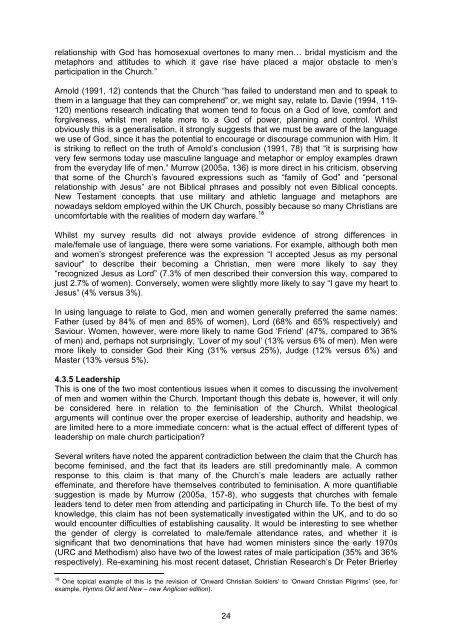Disbanded Brothers – Has a ‘Feminised’ Church Alienated Men in the UK?
Disbanded Brothers - Has a 'Feminised' Church ... - Theduckers.org
Disbanded Brothers - Has a 'Feminised' Church ... - Theduckers.org
- No tags were found...
You also want an ePaper? Increase the reach of your titles
YUMPU automatically turns print PDFs into web optimized ePapers that Google loves.
elationship with God has homosexual overtones to many men… bridal mysticism and <strong>the</strong><br />
metaphors and attitudes to which it gave rise have placed a major obstacle to men’s<br />
participation <strong>in</strong> <strong>the</strong> <strong>Church</strong>.”<br />
Arnold (1991, 12) contends that <strong>the</strong> <strong>Church</strong> “has failed to understand men and to speak to<br />
<strong>the</strong>m <strong>in</strong> a language that <strong>the</strong>y can comprehend” or, we might say, relate to. Davie (1994, 119-<br />
120) mentions research <strong>in</strong>dicat<strong>in</strong>g that women tend to focus on a God of love, comfort and<br />
forgiveness, whilst men relate more to a God of power, plann<strong>in</strong>g and control. Whilst<br />
obviously this is a generalisation, it strongly suggests that we must be aware of <strong>the</strong> language<br />
we use of God, s<strong>in</strong>ce it has <strong>the</strong> potential to encourage or discourage communion with Him. It<br />
is strik<strong>in</strong>g to reflect on <strong>the</strong> truth of Arnold’s conclusion (1991, 78) that “it is surpris<strong>in</strong>g how<br />
very few sermons today use mascul<strong>in</strong>e language and metaphor or employ examples drawn<br />
from <strong>the</strong> everyday life of men.” Murrow (2005a, 136) is more direct <strong>in</strong> his criticism, observ<strong>in</strong>g<br />
that some of <strong>the</strong> <strong>Church</strong>’s favoured expressions such as “family of God” and “personal<br />
relationship with Jesus” are not Biblical phrases and possibly not even Biblical concepts.<br />
New Testament concepts that use military and athletic language and metaphors are<br />
nowadays seldom employed with<strong>in</strong> <strong>the</strong> <strong>UK</strong> <strong>Church</strong>, possibly because so many Christians are<br />
uncomfortable with <strong>the</strong> realities of modern day warfare. 18<br />
Whilst my survey results did not always provide evidence of strong differences <strong>in</strong><br />
male/female use of language, <strong>the</strong>re were some variations. For example, although both men<br />
and women’s strongest preference was <strong>the</strong> expression “I accepted Jesus as my personal<br />
saviour” to describe <strong>the</strong>ir becom<strong>in</strong>g a Christian, men were more likely to say <strong>the</strong>y<br />
“recognized Jesus as Lord” (7.3% of men described <strong>the</strong>ir conversion this way, compared to<br />
just 2.7% of women). Conversely, women were slightly more likely to say “I gave my heart to<br />
Jesus” (4% versus 3%).<br />
In us<strong>in</strong>g language to relate to God, men and women generally preferred <strong>the</strong> same names:<br />
Fa<strong>the</strong>r (used by 84% of men and 85% of women), Lord (68% and 65% respectively) and<br />
Saviour. Women, however, were more likely to name God ‘Friend’ (47%, compared to 36%<br />
of men) and, perhaps not surpris<strong>in</strong>gly, ‘Lover of my soul’ (13% versus 6% of men). <strong>Men</strong> were<br />
more likely to consider God <strong>the</strong>ir K<strong>in</strong>g (31% versus 25%), Judge (12% versus 6%) and<br />
Master (13% versus 5%).<br />
4.3.5 Leadership<br />
This is one of <strong>the</strong> two most contentious issues when it comes to discuss<strong>in</strong>g <strong>the</strong> <strong>in</strong>volvement<br />
of men and women with<strong>in</strong> <strong>the</strong> <strong>Church</strong>. Important though this debate is, however, it will only<br />
be considered here <strong>in</strong> relation to <strong>the</strong> fem<strong>in</strong>isation of <strong>the</strong> <strong>Church</strong>. Whilst <strong>the</strong>ological<br />
arguments will cont<strong>in</strong>ue over <strong>the</strong> proper exercise of leadership, authority and headship, we<br />
are limited here to a more immediate concern: what is <strong>the</strong> actual effect of different types of<br />
leadership on male church participation?<br />
Several writers have noted <strong>the</strong> apparent contradiction between <strong>the</strong> claim that <strong>the</strong> <strong>Church</strong> has<br />
become fem<strong>in</strong>ised, and <strong>the</strong> fact that its leaders are still predom<strong>in</strong>antly male. A common<br />
response to this claim is that many of <strong>the</strong> <strong>Church</strong>’s male leaders are actually ra<strong>the</strong>r<br />
effem<strong>in</strong>ate, and <strong>the</strong>refore have <strong>the</strong>mselves contributed to fem<strong>in</strong>isation. A more quantifiable<br />
suggestion is made by Murrow (2005a, 157-8), who suggests that churches with female<br />
leaders tend to deter men from attend<strong>in</strong>g and participat<strong>in</strong>g <strong>in</strong> <strong>Church</strong> life. To <strong>the</strong> best of my<br />
knowledge, this claim has not been systematically <strong>in</strong>vestigated with<strong>in</strong> <strong>the</strong> <strong>UK</strong>, and to do so<br />
would encounter difficulties of establish<strong>in</strong>g causality. It would be <strong>in</strong>terest<strong>in</strong>g to see whe<strong>the</strong>r<br />
<strong>the</strong> gender of clergy is correlated to male/female attendance rates, and whe<strong>the</strong>r it is<br />
significant that two denom<strong>in</strong>ations that have had women m<strong>in</strong>isters s<strong>in</strong>ce <strong>the</strong> early 1970s<br />
(URC and Methodism) also have two of <strong>the</strong> lowest rates of male participation (35% and 36%<br />
respectively). Re-exam<strong>in</strong><strong>in</strong>g his most recent dataset, Christian Research’s Dr Peter Brierley<br />
18 One topical example of this is <strong>the</strong> revision of ‘Onward Christian Soldiers’ to ‘Onward Christian Pilgrims’ (see, for<br />
example, Hymns Old and New <strong>–</strong> new Anglican edition).<br />
24






